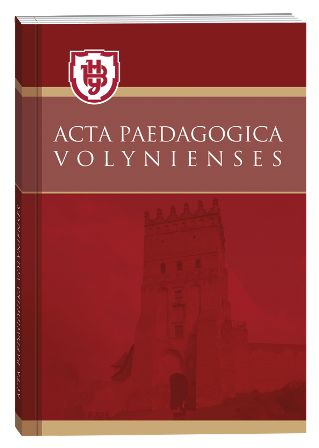АСПЕКТИ ФОРМУВАННЯ СПОСОБІВ МІРКУВАННЯ У ДІТЕЙ СТАРШОГО ДОШКІЛЬНОГО ВІКУ
DOI:
https://doi.org/10.32782/apv/2023.1.5Ключові слова:
старший дошкільник, способи міркування, монологічне, діалогічне, зв’язне мовлення, вміння, навичкиАнотація
Актуальність обраного аспекту дослідження детермінована вимогами Нової української школи щодо розвитку комунікативної компетентності підростаючого покоління, зокрема виховання мовної особистості, формування мовленнєвої компетенції дитини. Сказане об’єктивує посилення уваги до проблеми формування способів міркування у дітей старшого дошкільного віку. Методологічним підгрунтям нашого дослідження є теоретико – методичні напрацювання лінгводидактів, психолінгвістів, філологів про роль зв’язного мовлення у навчанні дошкільників рідної мови, про важливість методики формування у дітей старшого дошкільного віку способів міркування як важливого етапу мовної підготовки дітей до навчання у школі. Мета статті полягає в теоретичному узагальненні досліджень з проблеми формування у дітей старшого дошкільного віку способів міркування, виокремленні ключових завдань і принципів означеного процесу. Новизна нашого дослідження полягає в наступних положеннях: вперше категорія «міркування» розглядається в контексті мовленнєвого розвитку старшого дошкільника; узагальненні наукових підходів до практикування категорій «зв’язне мовлення», «монологічне мовлення», «міркування». Підкреслено, що розвиток зв’язного мовлення у старших дошкільників займає провідну роль у процесі їх мовного розвитку. Розмежовано поняття «діалогічне» й «монологічне мовлення», акцентовано на їх особливостях. У статті зроблені виважені висновки. Узагальнено, що застосування у практиці дошкільного навчання ефективних методів, прийомів сприяє активізація розвитку навичок міркування старших дошкільників. Акцентовано, що основною рушійною силою навчання в умовах закладу дошкільної освіти є зацікавленість дошкільника.
Посилання
Витоки мовленнєвого розвитку дітей дошкільного віку: Програма та методичні рекомендації / Укл. А.М. Богуш. К.: ІЗМН, 1997. 112 с.
Формування міркування як засіб реалізації індивідуальності і творчого розвитку дітей шестирічного віку у спадщині В.О. Сухомлинського. В.О.Сухомлинський і сучасні проблеми особистісно зорієнтованого виховання. К.: Науковий світ, 2000. С. 118–120.
Великий тлумачний словник сучасної української мови / Під ред. В.Т.Бусел. К.: ВТФ Перун, 2001. 1440 с.
Білан О.І. Зв’язне мовлення: наступність у роботі дошкільного закладу і школи. Науковий вісник Південноукраїнського державного педагогічного університету імені К.Д. Ушинського (Зб. наук. пр.). Вип. 9. Одеса, 2001. С. 78–84.
Дзюбишина-Мельник. Н.Я. Розвиток українського мовлення у дошкільників / Н.Я. Дзюбишина-Мельник. К., 1991. 89 с.
Пасічник А. Казка як засіб розвитку словесної творчості / А. Пасічник, В.Бєлова // Дошкільне виховання. К., 2009. № 10. С. 11–13.
Богуш А.М., Гавриш Н.В. Дошкільна лінгводидактика: теорія і методика навчання дітей рідної мови. Підручник / За ред. А.М. Богуш. К.: Вища школа, 2007. 542 с.
Значення використання логіки в методиці навчання дітей міркування. Гуманізація навчально-виховного процесу. Слов’янськ: ІЗМН СДПУ, 2003. Вип. 17. С. 225–233.
Мовленнєвий компонент дошкільної освіти / Богуш А.М. Ярослав, 2004. 78 с.







